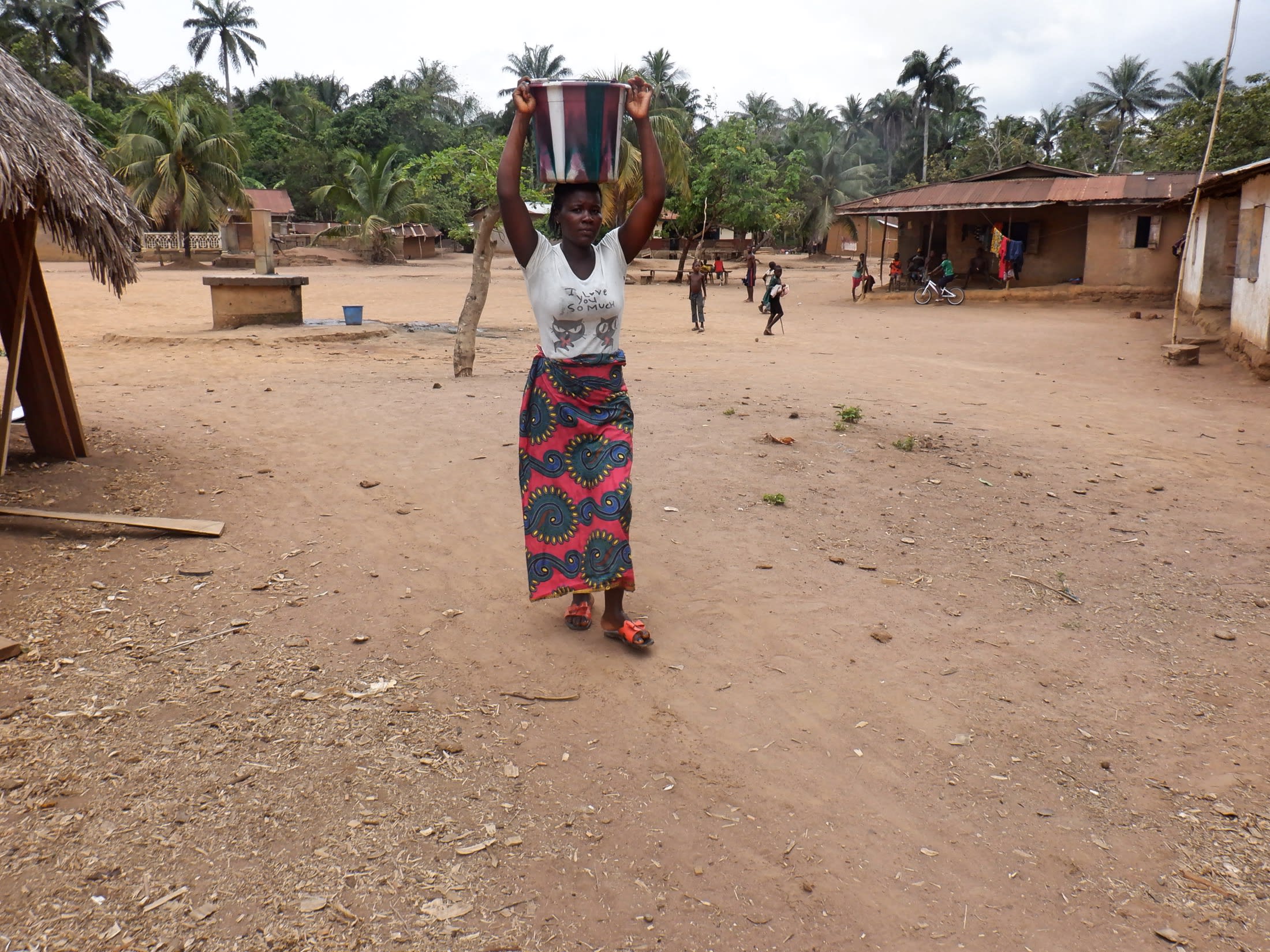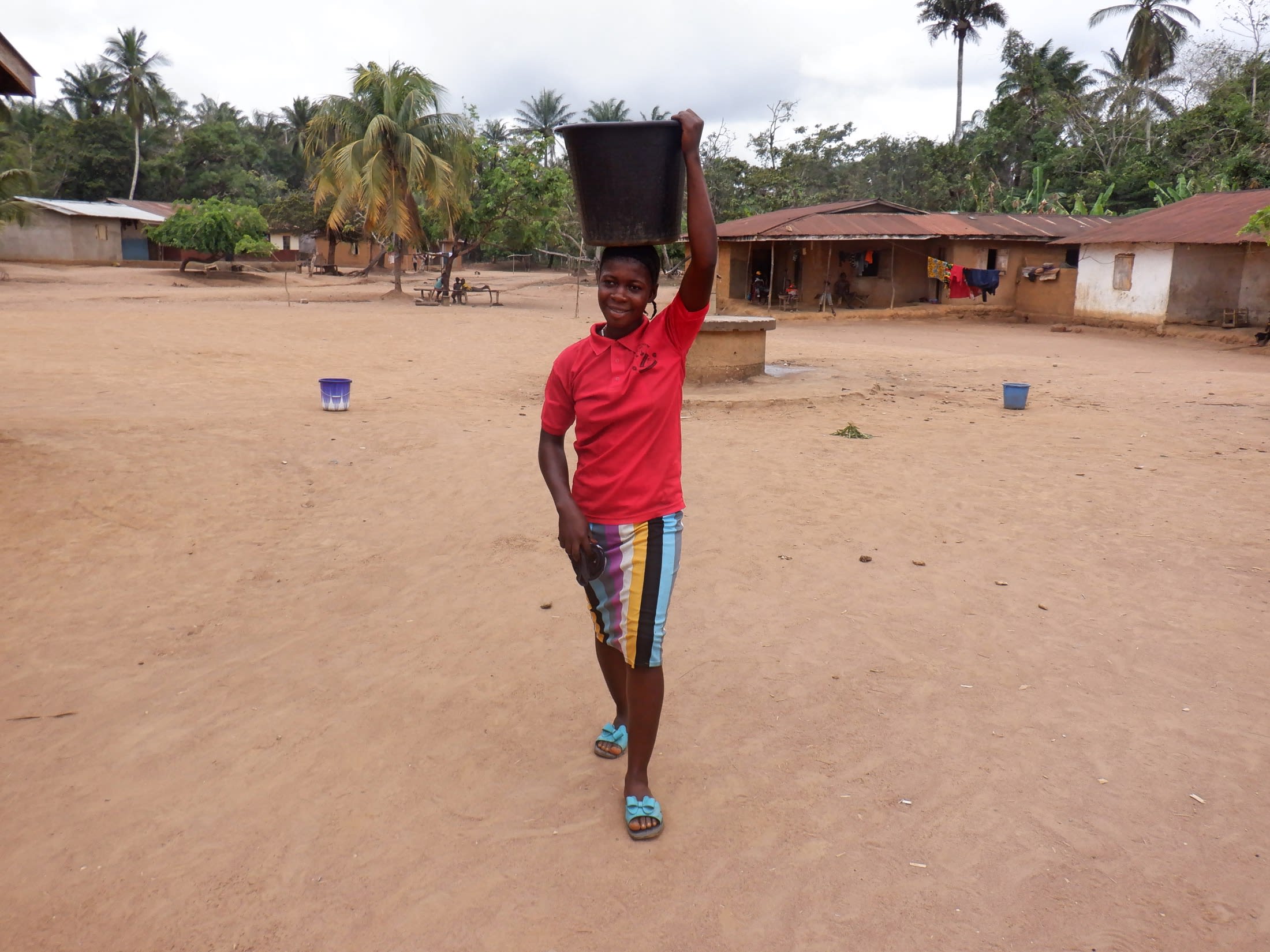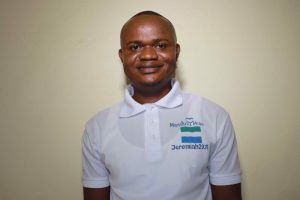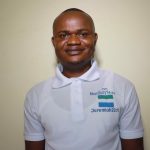August, 2023: Forikolo Community Well Rehabilitation Complete!
We are excited to share that a safe, reliable water point at Forikolo in Sierra Leone now provides community members clean water! We also conducted hygiene and sanitation training, focusing on healthy practices such as handwashing and latrines.

The community celebrating clean water!
"Women and children deal with the issues with water constraints in our community. Now that this water point is complete, I am going to have more time to prepare food before nightfall. I am going to spend more time at home monitoring my children with their studies, and no more excuses for not studying. In the past, they made all the excuses in the world to get out of studying, but now, everyone is to be indoors before nightfall. Even though I never went to school, I can sit with my children and make sure they are doing their homework. I expect them to have better grades and avoid repeating any class," said 24-year-old trader Adamsay Kamara.

Adamsay.
16-year-old Maseray, whom we spoke to when we first visited the community, shared her heart about how she envisions having access to clean water will now change her life. "Now that this water point is complete, I will be able to live a life of comfort. I no longer must stand in long lines or get into an argument with anyone, which means more time to myself. As a young girl growing up in the village, work is my middle name. I work day and night from one chore to the other, spending most of the time fetching water and doing laundry. If only people can see my heart, they can see that I am happier now than I have ever been before. I feel like I just received a large sum of money because of the water well."

Maseray drinking from the new well.
"As a village girl, our dreams of becoming productive members of society are crushed because of limited or no financial assistance. I dream of leaving the village and pursuing a career as an accountant. After hearing from so many family members that schools are not for girls, I feel discouraged to just forget about school. I am encouraged by the water well because there are people out there that think that I can and will make it in life. I know that everyone in the community is going to benefit from the water well, but I feel as if it was constructed for me alone. This water well is going to slowly help me realize my dreams," Maseray continued.
"It is very important for all school-going children to have access to clean and safe water. The shame of going to school with a dirty uniform used to break my heart, more so that it paralyzed me from going to school every day. The fear of being laughed at was so paralyzing that I immediately started feeling sick just thinking about going to school. Thank you, God, for moving me a step closer to achieving my dream. Next school year, I am going to try my best to be among the top 10 students in my class," concluded Maseray.
We held a dedication ceremony to officially hand over the well to the community members. Several local dignitaries attended the ceremony, including representatives from the Port Loko District Council and the Ministry of Water Resources. Each official gave a short speech thanking everyone who contributed to the rehabilitation of the water project and reminding everyone to take good care of it. Then, Adamsay and Maseray made statements on their community's behalf. The ceremony concluded with celebration, singing, and dancing.
Clean Water Restored
The drill team arrived the day before beginning work. They set up camp and unpacked all their tools and supplies to prepare for drilling the next day. The community provided space for the team to store their belongings and meals for the duration of their stay. The following day, the work began.
First, we put the drill in the proper place. Next, we measured the well's original depth. We then socketed the pipes and installed a casing.

Starting to drill.
Finally, we lined up the drill rods and started to drill! We reached a final depth of 17 meters with water at 12 meters. The hand-drill method allowed the team to install the cylinder far below the aquifer so that the community has excellent water access throughout the year.
With drilling complete, we installed screening and a filter pack to keep out debris when the water is pumped. We then cemented an iron rod to the well lining and fixed it with an iron collar at the top.

The yield test.
Next, we bailed the well by hand for three days and flushed it, clearing any debris generated by the drilling process. Finally, we tested the yield to ensure the well would provide clean water with minimal effort at the pump.
As the project neared completion, we built a new cement platform, walls, and drainage system around the well to seal it off from surface-level contaminants. The drainage system helps to redirect runoff and spilled water to help avoid standing water at the well, which can be uncomfortable and unhygienic and a breeding ground for disease-carrying mosquitoes.

Installing the pump.
At last, we installed the pump and conducted a water quality test. The test results showed that this was clean water fit for drinking!

The completed well.
"On cue, singing and dancing can break out at any time using basic household items and sticks to make very sweet melodious music. Imagine waiting for something that the entire village was absolutely in need of, and finally, God answered your prayers. No amount of singing and dancing will begin to express the joy the heart feels," shared field officer Fatmata Kalokoh.

Community members dancing and celebrating!
New Knowledge
Before conducting any hygiene training, we called and visited the local water user committee to understand the community's challenges and lack of sanitation facilities. We shared the findings from our discussions with the committee members to help them make the necessary adjustments before the training began. For example, we identified households without handwashing stations or ones that may need to repair their latrines. With this information, community members worked together to improve hygiene and sanitation at home.
We also invited a nurse from the local clinic to help explain some topics and spread awareness about Sierra Leone's free vaccinations for children under five. The nurse was instrumental in reinforcing each lesson.

The nurse teaches the proper hand-washing techniques.
After this preparatory period, we scheduled a time when members from each household using the water point could attend a three-day hygiene and sanitation training. We then dispatched our teams to the agreed-upon location to hold the meeting.
Training topics covered included handwashing and tippy taps, good and bad hygiene habits, teen pregnancy, worms and parasites, proper dental hygiene, menstrual hygiene, proper care of the well's pump, keeping the water clean, the cost recovery system, the importance of using dish racks and clotheslines, the importance of toilets, keeping latrines clean, balanced diets, the diarrhea doll, and disease transmission and prevention, COVID-19, Ebola, Hepatitis, HIV and AIDS.

Learning about disease transmission.
"The three days [of] hygiene and sanitation training were valuable to me. I was able to learn different things of which I was ignorant about. During the three days [of] training, I was able to learn the importance of visiting the hospital for checkups and treatment, [and] the importance of having and using latrines. From all the lessons, the most important was we, the people, have a lot to do with our well-being and health based on the decisions we make daily. It is a blessing for me to attend this training, and I believe when [I] put into practice all that I have learned, my life will be free from most illnesses. This training has helped me much, and I believe it will not only create a change in my life, but I will also try to create the same change in the lives of others in the community," said Adamsay, who was quoted earlier.
Conclusion
This project required a substantial collaboration between our staff, our in-country teams, and the community members. When an issue arises concerning the well, community members are equipped with the necessary skills to rectify the problem and ensure the water point works appropriately. However, if the issue is beyond their capabilities, they can contact their local field officers to assist them.
Also, we will continue to offer them unmatchable support as a part of our monitoring and maintenance program. We walk with each community, problem-solving together when they face challenges with functionality, seasonality, or water quality. Together, all these components help us strive for enduring access to reliable, clean, and safe water for this community.
With your contribution, one more piece has been added to a large puzzle of water projects. In Kenya, Uganda, and Sierra Leone, we're working toward complete coverage. That means reliable, maintained water sources within a 30-minute round trip for each community, household, school, and health center. With this in mind, search through our upcoming projects to see which community you can help next!
Thank you for making all of this possible!









 Borehole Well and Hand Pump
Borehole Well and Hand Pump





























